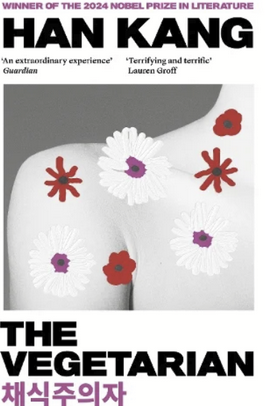In The Vegetarian, Han Kang justifies the main protagonist Yeong Hye’s decision to become one with nature through the traumatic experiences of her past. Han Kang explores psychological trauma rooted in both her childhood and adulthood, highlighting the patriarchal violence and Confucian expectations of Korean culture and society. Through the use of major symbolisms such as “meat” and Yeong Hye’s dreams flashing back to her past traumas, Han Kang gives insight to a character’s complex relationship to the past and how this affected her overall life. Through the experiences of Yeong Hye and her story leading to her vegetarian decision, the author discusses effects of trauma while implying a deep criticism on Korean culture embedded with confucius and patriarchal beliefs.
Throughout the novel, “meat” functions as both a recurring and significant metaphor for the masculine dominance and violence Yeong Hye deals with. Her strong repulsion towards meat is driven from the violence she endures from male figures in her life, such as her husband. For example, in one of the most disturbing scenes of the book, Mr. Cheong forces himself on her and recalls how she “layed there in the dark staring up at the ceiling” with her “face blank as though she were a ‘comfort woman’ dragged in against her will” (Han 24). Mr. Cheong’s direct quote reduces Yeong Hye to a historical symbol of violated women invoking wartime trauma to emphasize the personal violence she endures. The way Han Kang uses intricate detail and similes comparing Yeong Hye to “comfort women” strongly suggests that women are merely objects of men and victims of the patriarchal force. However, the author’s purpose of writing this scene isn’t simply to criticize the Korean culture and society but also to emphasize the deeper meaning behind Yeong hye’s vegetarian transformation. In fact, following such traumatic event, when Mr. Cheong questions Yeong Hye’s lack of intimacy with him, she sharply remarks that his body “smells of meat”. (Han 17) This moment reveals how for Yeong Hye, meat became an inseparable symbol of male body and a sense of trauma that she rejects. The connection between meat and male dominance is further highlighted in a heated family meal. When Yeong Hye refuses to eat meat, her father erupts in anger commanding her to “listen to what your father’s telling you.” (Han 27) In this moment, Han Kang purposefully has the father refer to himself in the third person –”father” – rather than first person. This deliberate choice highlights the authoritative role he believes the title grants him within the family hierarchy, reflecting traditional Confucian values that position men as absolute figures of power. The encounter quickly escalates into physical violence ultimately leading to Yeong Hye’s wrist being slashed open. The graphic imagery of her “blood ribboning out of her wrist” almost portrays Yeong Hye herself as a piece of meat. (Han 27) This scene once again connects the symbolism of meat to the violence perpetrated by the patriarchal society where women are treated more like objects and a subject to male dominance. Through these repeating patterns throughout the book, Han Kang criticizes the traditional values of South Korea while also justifying Yeong Hye’s transformation based on her traumas.
An equally important symbol that leads her to further reject society is the dreams and the past memories she is forced to reencounter. In one of the most vivid scenes of the book, Yeong Hye finds herself in a barn filled with “a long bamboo stick strung with great blood-red gashes of meat, bood still dripping down”. She then goes on to describe how “there’s no end to the meat, and no exit”. (Han 14) The portrayal of meat hanging down in an entrapped place once again highlights Yeong Hye’s traumatic experiences of her adulthood perpetrated by men. The almost claustrophobic scenery furthermore adds to how the everlasting traumas linger in individuals’ minds, emphasizing the impact past memories have on individuals. Yeong Hye’s trauma however is not limited to adulthood. In another series of dreams, she reencounters a chilling scene from her childhood watching passively as her father ties a dog to a motorcycle and forces it to run until it dies as it “vomits blackish-red blood”. (Han 29) The grotesque and vivid imagery of this memory however contrasts deeply with her cold and detached reaction as she remembers how “she didn’t really care.” This traumatic scene that plays in her adulthood and the ironic indifference she has of these experiences in her childhood reveal the emotion repression and obedience that is normalized under the Confucian system. Han Kang uses this trauma once again planted by a male figure, to show both the lasting memories individuals with traumas live with and also the cold and inhumane values that the patriarchal society normalizes.
The novel The Vegetarian shares the life of a woman scarred by extensive traumas from both her childhood and adulthood. Through her strong rejection of “meat”, her withdrawal from human relationships, her desire to become one with nature, and the disturbing replaying of her traumatic dreams, Han Kang reveals the deep and lasting impact these past memories left on Yeong Hye. Specifically, the author highlights how her experiences with male violence and control are not isolated incidents but part of a larger cultural structure that treats women as submissive and voiceless. Han Kang however doesn’t merely use these traumas as a justification for the main character’s transformation but also uses it to criticize the very confusing system that normalizes such values in South Korea. The book implies a broader critique of the social construct of Korean society where men assert dominance over women and use them as subjects to their power. Yeong Hye’s transformation into a plant represents a powerful act of resistance and escape. Through this Han Kang delivers her views on human nature dealing with everlasting traumas and also the cost of such corrupt social values and traditions.
Y.Lee




